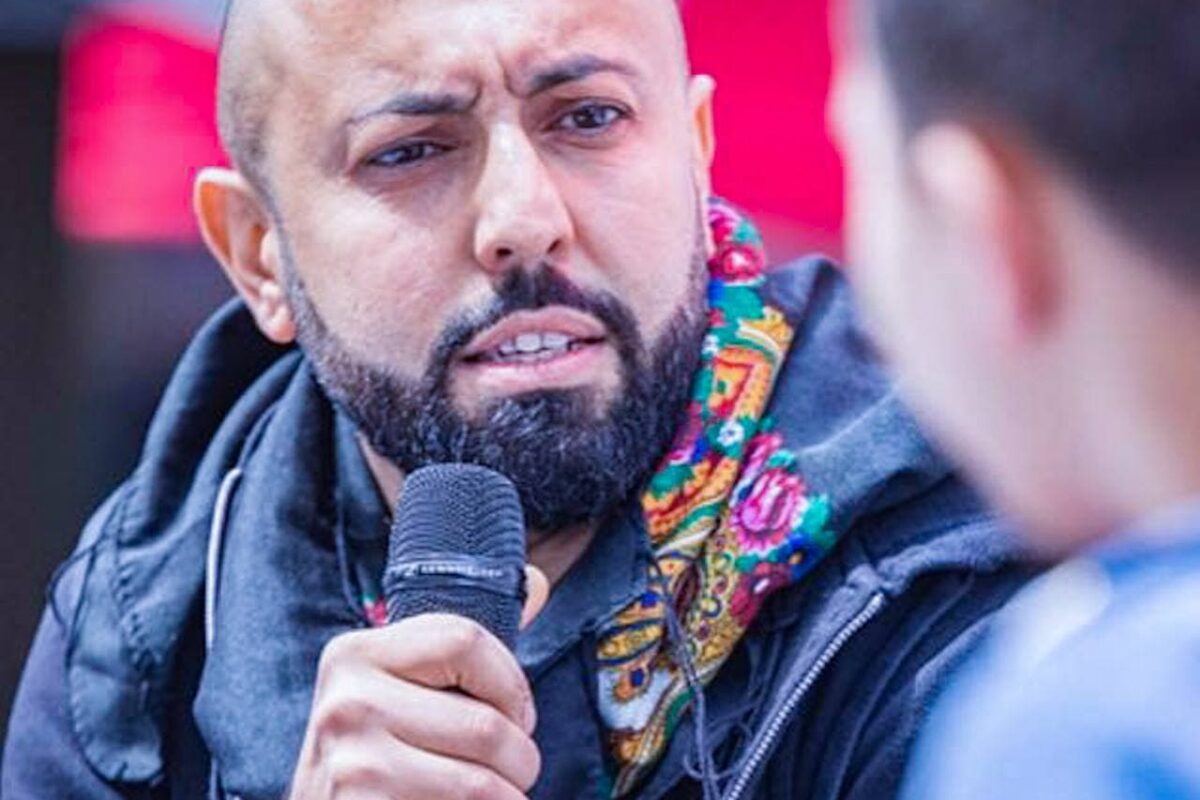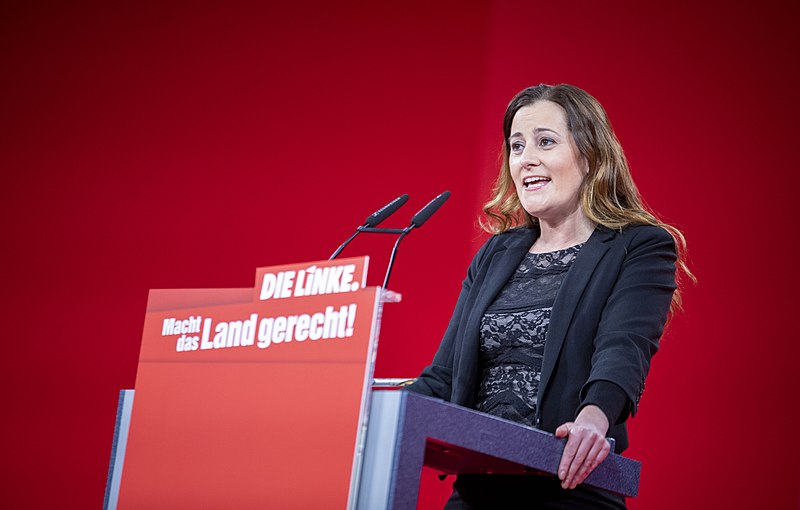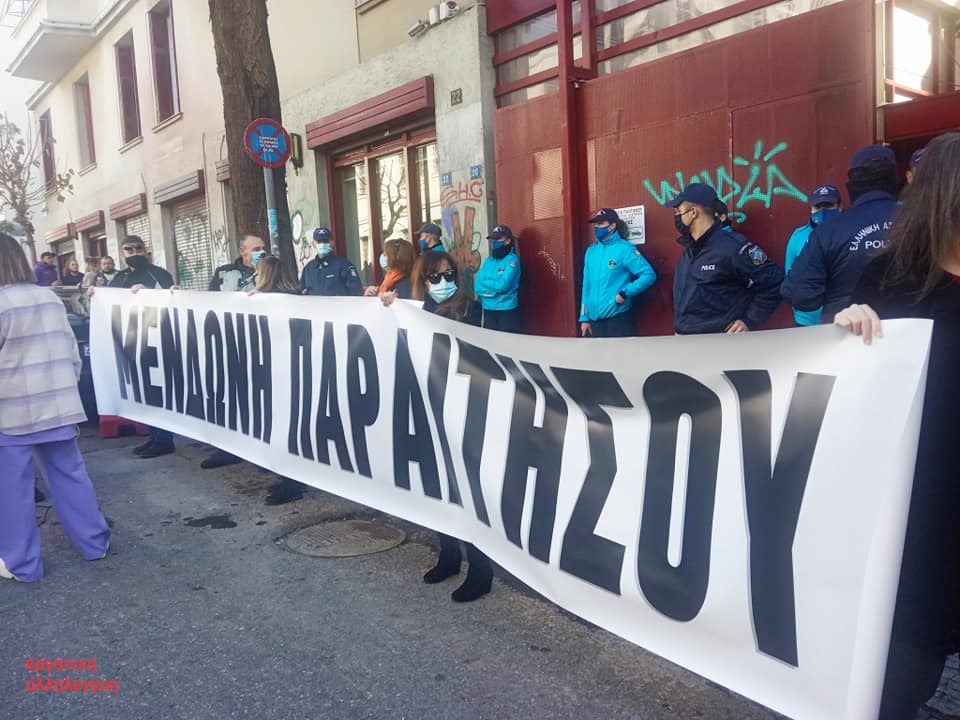Ferat Ali Kocak, also known on social media as Der Neuköllner, is the deputy speaker of Die LINKE Neukölln and has been active since childhood in various anti-racist and anti-fascist initiatives.
Hello Ferat. How did you become involved in politics?
Because of the background of my parents, I was socialised in Turkish and Kurdish left-wing movements. My father is a trade unionist, my mother is a feminist and the child of guest workers. My father was a political refugee. He came to Germany as a student before the military coup in Turkey and as a child they took me to all political events. My parents always said that they changed my nappies at the Otto-Suhr Institute [political science institute at the Free University in Berlin] between Karl Marx and Rosa Luxemburg texts.
In my youth, I had a strong focus on diaspora and international politics. I then studied economics and politics at the Free University and started to get involved in student politics. I understood there that it’s important that people with a “history of migration” concentrate more on German politics.
I believe that it’s difficult to change things in other areas if we don’t focus on the politicians, parties and structures here in Germany and effect change here, in particular through social movements.
We have just mourned the first anniversary of the Hanau massacre. What did the commemoration events look like?
Different initiatives organised various memorial rallies on 19th February 2021. Nationally, there were over 120 actions, in Berlin 4 local rallies – at Oranienplatz in Kreuzberg, at Leopoldplatz in Wedding, in Neukölln in front of the town hall, and then an additional rally at Alexanderplatz. In total, about 6-7,000 people in Berlin came to mourn together.
The initiatives in Neukölln raised the issue of general police harassment of migranticised people, particularly in Shisha bars. An important national initiative was Migrantifa, which was formed after Hanau as an alliance to support anti-racism and anti-fascism for and from migrants and to bring different anti-racist movements together. In Berlin, the rallies were organised by Migrantifa, Young Struggle, and DIDF, a Turkish left-wing organisation together with other groups.
On the next day, there was a demo in Berlin against racism and fascism with 20,000 people. The demo took a very long route through Neukölln and Kreuzberg. What was important was that we were mourning, commemorating the names of the Hanau victims, but at the same time it was a fight. We understood that we must resist.
You are a victim of Nazi attacks yourself. What happened?
In 2018, Nazis made an arson attack on me and my family, which we barely survived. For 11 years there have been attacks on activists in Neukölln and although the offenders are known, the rate of detection from the police has been 0%. In my case, it was particularly clear that the police knew that I had been watched and followed by Nazis, and that they’d found out where I live 2 weeks before the attack. Despite all this, no one intervened.
The Nazi terror in Neukölln was concentrated in South Neukölln until 2018, but in the last couple of years there have been numerous attacks on migrants in North Neukölln. Some of the scandals have involved the investigating authorities. In one such case, there was a meeting between a Nazi and a state official. There were further scandals, such as when the Nazis from Neukölln received information from a police official in a Telegram chat asking for names.
The NSU terror [far-right terror group which carried out murders with state support] showed up connections between Nazis and the police. For example the Falkenhaus, a youth centre, was torched after being on the NSU terror list.
I’ve now received regular threats from NSU 2.0 by text message and e-mail. The criminal investigations have come to no conclusions; indeed, one of the prosecuting lawyers has told one of the prime suspects that there’s no need to worry, as he is on their side. This prosecutor must be removed.
Nazis can only operate freely because they’ve not been arrested and the police investigations have led to nowhere. The structures are changing here. The Dritte Weg [a German Nazi party] has become very strong in Neukölln, and is trying to establish itself in the whole of Berlin. The Nazi structures here developed in the 1990s through the Hertha Berlin football club fan base. The Nazis recruited young people and built them up. Here, they were strengthened by NPD structures, later by AfD structures.
What is the connection between Nazi terror and the political success of the AfD?
After the AfD entered parliament they have had many possibilities to support these politics of hatred. One of the prime suspects for the Nazi terror in Neukölln is a former chairman of the NPD [the main German Nazi party], now a member of the Dritte Weg and a very good friend of his is a former member of the AfD leadership in Neukölln. Here in Neukölln, we’re see very clearly how these parties come together – the NPD, Dritte Weg, and the AfD. The AfD is very strong here in Neukölln with 14% in the local elections.
We call the AfD the “geistige Brandstifter” [there is no good direct translation of this phrase, which roughly means “psychological agitators”]. They stir up hatred in parliament and the terrorists on the street put it into practise. This is what happened in Hanau. This is what happened in Halle [site of another murderous racist attack], and it’s also what’s happening every day in Neukölln.
When we mention terror, we’re not just talking about murder. We’re also talking about drawing swastikas. This is a conscious terror which is trying to send a signal: “We are here. You’re not welcome”. We know this from history as Jewish shops were marked with swastikas with the word “Raus” (get out).
This is their politics – these methods of bringing fear, exclusivity, and hatred onto the street. The AfD is strongly anchored in these Nazi structures which are ready to use violence – here in Neukölln but also elsewhere. In areas where there are no Nazis, the phraseology of the terrorists still comes through.
We have another problem. The AfD sets the tone of politics from the right, and the neoliberal parties follow these politics. In Neukölln and elsewhere the SPD mayor has stigmatised migrants. There have been police raids on mosques with accusations of Corona fraud. Would they do this in a church or synagogue? No, they wouldn’t.
And here we see quite clearly that the parties of the centre play into the hands of the Nazis as they reproduce their bogeymen in the middle of society. And this is a real problem which we must counter.
It’s not just individual skinheads. We increasingly hear about collaboration between groups of Nazis and the German state, for example in the so-called “NSU affair”. How deep does this collaboration go?
It’s interesting that with these police scandals, again and again the police try to push it into the long grass. They tell investigative journalists that “we don’t have a problem.” Victims of the attacks are active in this are. We don’t just want a couple of Nazis to be sent to jail. We also want to look at the structures behind it all. We want to look at the failure of government which has led to 11 years of Nazi terror without anything being detected.
We see again and again that weapons are “lost” by the police and army. There are connections between the army and Nazis. There’s the case of the Interior Minister of Mecklenburg-Vorpommern, who bought a weapon from a Nazi.
These are not just structures inside the state apparatus, although individual people are there. There are also those who support Nazi terror or prevent information getting out, or show their sympathy, up to the state indirectly organising the logistics for Nazis. We have a terrible problem here.
I would say that in Germany we’ve gone so far that we must talk about the deep state. That happened in other countries very rapidly. In Germany there’s a fear of the country’s Nazi past, which people don’t want to talk about. This means that we are lacking information about what happened in the past.
The NSU files have been sealed for 120 years. Why? What is in them that is not suitable for public knowledge? When there is right wing involvement of the police, knowledge is always prevented, but we must talk about right wing involvement in the judiciary. Too little is reported.
It’s important that we make demands of society as a whole and to try to shift the parties in the middle of society to organise investigations in the state apparatus. If we don’t fight the Nazis in the state apparatus, we have no chance of stopping the Nazis on the streets, as the state will always defend them.
This is why it’s important that we make clear demands that those affected in Neukölln need a Commission of Inquiry into right-wing involvement in the police. And we need to go onto the streets to achieve this.
The buck stops at the SPD. The LINKE has always made these demands, but can’t push it through in their own. The Greens are moving in the same direction and are now making similar demands. But the SPD is blocking them and the Minister for the Interior is saying that nothing of the sort will happen. “There are no Nazis in the police”. “There is no racism in the police”. And this is exactly the wrong way to do things.
Can we trust the German police?
I think it’s important to talk about alternative possibilities, about social solutions regarding decriminalisation. In this context, we need to see the power structures in the police differently. Such a distribution of power ensures that things like this happen.
Here it’s not individual police officers to blame, but the whole institution. There can’t be a state within the state, no structure in the state that isn’t actively there for the public good. Endeavours are developing that are anti-constitutional and undemocratic. And individual police officers are unable to say “I can’t do that”.
For this reason, it’s difficult for me to trust the German police or the executive. This is not just because of the left wing analysis of the police in the state apparatus – it’s clear to all of us that the police are to some extent the wall between the capitalists, the interests of capital and workers.
We need to create structures which destroy such concentrations of power and move towards a society of solidarity where we don’t need the police. Where we don’t need executive power, we don’t need military power.
Maybe it’s wishful thinking, but we need to make efforts in this direction. I think we must look to see how we can create new structures which take over the old responsibilities of the police and don’t act as executive power.
You are an active member of Die LINKE. Why?
Because I support solidarity. Because I stand for people and nature before profits. Or even instead of profits. We need to see how we can develop into a society where there is a redistribution and no-one lives in poverty anymore.
Let’s look at Germany. Germany is one of the richest countries in the world. Why are there homeless people here? Why are there children who don’t have a laptop, who can’t take part in the digital school during Corona? Why is there Hartz IV in Germany? One of the richest countries in the world has to fight poverty itself because our economic system lacks solidarity.
As a leftist, I don’t want to get rid of democracy. I want to fight the capitalist economic system and for a good life for everyone.
In September, you are standing as a candidate for the Berlin parliament. What do you think you can achieve as a local councillor?
In the first place, I can use my position as councillor to give more space to specific subjects – in my case anti-racist and anti-fascist movements. That does not mean deciding what social movements should say, but giving them the space to be their own voice. I can use my position as a councillor to ensure that social movements get the platform that they need, that they have access to the necessary infrastructure.
The job of a councillor is not to be like the police and stand between capital and fighting workers and tenants, people who are threatened with eviction. It is to protect people fighting on the streets and to have their backs.
I’m not a bureaucrat. I’m not someone who looks at a piece of paper for hours and tries to make a settlement with other councillors. I’m someone who gained his understanding of politics on the street. I want to go into the council chamber with this understanding.
For me it’s about strengthening the chains uniting the fights on the street with parliament. It’s about bringing the street into parliament.
Is it possible to combine basis activism with official politics?
I think that there are some important initiatives here – Deutsche Wohnen & Co Enteignen for example. We need more of these campaigns. The problem is that many campaigns are very arduous. We must see how we can strengthen basis democratic structures in order to make more participation possible.
That means we must see how we can distribute more responsibility on the local level and not decide everything from above “top down”. We need a much stronger bottom-up politics with responsibilities held by those below. The ideas of basis democracy can be organised quite differently.
More can be implemented at a local level if there’s more responsibility and more room for manoeuvre in the local council chambers. This is how we can better link the parliamentary work with action on the streets. I think that that is very important.
What does the future of anti-racism in Germany look like?
After Hanau and the death of George Floyd, we now have a massive movement which is going in a particular direction. It has an understanding of anti-racism and anti-fascism as things which belong together. It’s also going a bit further. In Berlin because of both heavy gentrification and strong social movements, there’s an understanding that anti-racism can’t be separated from all other movements.
Anti-racism has become a cross-sector subject in all movements – in tenants’ struggles, in the fight of health workers, in environmental struggles. I find that anti-racism in Germany is now being judged on a quite different level.
There is a danger that internal disputes about anti-racism become stronger, that self-reflection can play a larger role than the fight outside on the streets. We must ensure that we fight anti-racist struggles on the streets. We also need self-reflection but this should not deter us from fighting together.
Anti-racism and anti-fascism cannot be separated from social struggles like the environment. We must see how we can connect the struggles. We need to unite all struggles into one for a society of solidarity where everyone can have a good life and that people and nature stand before profit.
This is a translation of an interview which originally took place in German. Translation: Phil Butland






